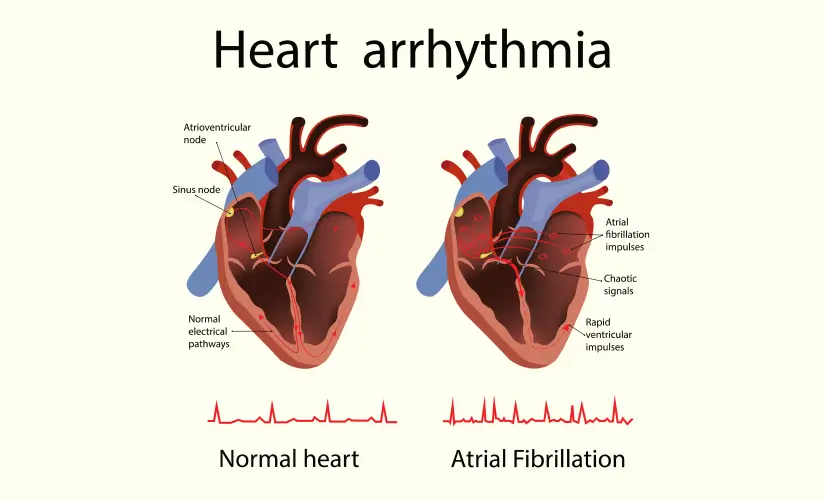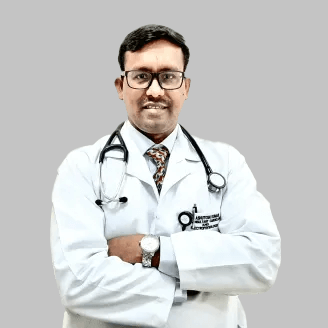-
Doctors
-
Specialities & Treatments
Centre of Excellence
Specialties
Treatments and Procedures
Hospitals & Directions HyderabadCARE Hospitals, Banjara Hills CARE Outpatient Centre, Banjara Hills CARE Hospitals, HITEC City CARE Hospitals, Nampally Gurunanak CARE Hospitals, Musheerabad CARE Hospitals Outpatient Centre, HITEC City CARE Hospitals, Malakpet
HyderabadCARE Hospitals, Banjara Hills CARE Outpatient Centre, Banjara Hills CARE Hospitals, HITEC City CARE Hospitals, Nampally Gurunanak CARE Hospitals, Musheerabad CARE Hospitals Outpatient Centre, HITEC City CARE Hospitals, Malakpet Raipur
Raipur
 Bhubaneswar
Bhubaneswar Visakhapatnam
Visakhapatnam
 Nagpur
Nagpur
 Indore
Indore
 Chh. Sambhajinagar
Chh. SambhajinagarClinics & Medical Centers
Book an AppointmentContact Us
Online Lab Reports
Book an Appointment
Consult Super-Specialist Doctors at CARE Hospitals

Arrhythmia
Symptom, Causes, Diagnosis and Treatment
Arrhythmia
Arrhythmia is a broad term that encompasses a range of heart rhythm disorders. The heart's natural rhythm is controlled by a complex system of electrical impulses originating in the sinoatrial (SA) node, often called the heart's natural pacemaker. In a healthy heart, the electrical signals that coordinate the heart's contractions travel through specialised pathways, ensuring a consistent and regular heartbeat. However, these electrical signals may be disrupted in individuals with arrhythmia, leading to an irregular, rapid, or slow heart rate.

Types of Arrhythmia
Arrhythmia can be classified into several distinct categories, each with its unique traits and potential consequences:
- Atrial Fibrillation (AFib): AFib is the most common type of arrhythmia, distinguished by a rapid and irregular heartbeat in the heart's upper chambers (atria). It can increase the risk of stroke and other cardiovascular complications.
- Ventricular Tachycardia (VT): This condition includes a rapid heart rate arising in the lower chambers of the heart (ventricles). VT can be life-threatening if not properly managed.
- Bradycardia: This type of arrhythmia is distinguished by a slow heart rate, often below 60 beats per minute. Bradycardia can lead to fatigue, dizziness, and, in severe cases, fainting.
- Premature Ventricular Contractions (PVCs): These are extra heartbeats that originate in the ventricles and are felt as a "skipped" or "fluttering" heartbeat.
- Supraventricular Tachycardia (SVT): This condition involves a rapid heart rate that originates above the ventricles, often in the heart's upper chambers.
Warning Signs and Symptoms of Arrhythmic Heartbeat
The most common warning signs and symptoms of an arrhythmic heartbeat include:
- Palpitations or a feeling of a "fluttering" or "racing" heart
- Chest pain or discomfort, especially during physical activity
- Shortness of breath
- Dizziness or lightheadedness
- Fainting or near-fainting episodes
- Fatigue or weakness
- Irregular or skipped heartbeats
- Feeling of unease or impending doom
Causes and Risk Factors of Arrhythmia
Various factors, both genetic and environmental, can cause arrhythmia. Some of the most common causes and risk factors of arrhythmia include:
- Structural heart conditions: Cardiovascular conditions, such as coronary artery disease, heart valve disorders, and congenital heart defects, can disrupt the heart's electrical system and lead to arrhythmia.
- Electrolyte imbalances: Instability in electrolytes, such as potassium, sodium, and calcium, can affect the heart's electrical signals and contribute to the development of arrhythmia.
- Lifestyle factors: Habits such as excessive alcohol intake, caffeine consumption, stress, and lack of physical activity can increase the risk of arrhythmia.
- Underlying medical conditions: Conditions like thyroid disorders, diabetes, and sleep apnea have been related to an increased possibility of developing arrhythmia.
- Medications: Certain medicines, including some prescription drugs and over-the-counter supplements, can potentially trigger or exacerbate arrhythmia.
- Genetics: In some cases, arrhythmia may have a genetic component, with specific genetic mutations increasing an individual's susceptibility to the condition.
Complications of Arrhythmia
Some of the most common complications associated with arrhythmia include:
- Stroke: Atrial fibrillation, the most common type of arrhythmia, can increase the risk of stroke by up to five times.
- Heart failure: Prolonged or severe arrhythmia can weaken the cardiac muscle and impair its ability to pump blood effectively, leading to the development of heart failure.
- Sudden cardiac arrest: In some cases, certain types of arrhythmia, like ventricular tachycardia or ventricular fibrillation, can trigger sudden cardiac arrest, a life-threatening condition that requires immediate medical intervention.
- Reduced quality of life: The symptoms associated with arrhythmias, such as palpitations, dizziness, and fatigue, can significantly impact an individual's daily activities and overall quality of life.
- Increased risk of hospitalisation: Individuals with uncontrolled or severe arrhythmia may require frequent hospitalisations, which can lead to additional health complications and increased healthcare costs.
Diagnosis of Arrhythmia
The doctor may use the following methods to diagnose arrhythmia:
- Electrocardiogram (ECG or EKG): This test records the heart's electrical activity, helping to identify the type and pattern of the arrhythmia.
- Holter monitoring: A portable device worn for 24 to 48 hours that continuously records the heart's electrical activity, which can help detect intermittent arrhythmias.
- Stress testing: This test evaluates the heart's function during physical activity, which can help identify arrhythmias during exercise.
- Echocardiogram: This imaging test creates a visual representation of the heart, which can help identify underlying structural issues that may contribute to arrhythmia.
How is an Arrhythmia Treated?
The treatment for arrhythmia depends on its type, severity, and underlying cause. The treatment options include:
- Medications: Certain medicines, such as antiarrhythmic drugs, beta-blockers, or calcium channel blockers, can help regulate the heart's rhythm and control arrhythmia symptoms.
- Cardioversion: This procedure uses electrical shocks or medications to restore the heart's rhythm.
- Ablation: This minimally invasive technique uses heat or cold energy to destroy the specific areas of the heart that are causing the arrhythmia.
- Implantable devices: In some cases, a pacemaker or implantable cardioverter-defibrillator (ICD) may be essential to help regulate the heart's rhythm.
- Lifestyle alterations: Adopting a healthy lifestyle, such as maintaining a balanced diet, exercising regularly, and managing stress, can help prevent or manage arrhythmia.
Prevention
The following are some steps that can reduce the risk of developing arrhythmia or managing existing conditions:
- Maintain a healthy lifestyle: Eating a heart-friendly diet, exercising regularly, and achieving and maintaining a healthy weight can manage and reduce the risk of developing arrhythmia.
- Manage underlying medical conditions: Systemic conditions like high blood pressure, diabetes, or thyroid disorders can contribute to the development of arrhythmia.
- Avoid triggers: Certain substances, such as caffeine, nicotine, or alcohol, can trigger or worsen arrhythmia episodes.
- Manage stress: Long-term stress can contribute to the development of arrhythmia, so it's essential to find healthy methods to manage stress, such as meditation, yoga, or other relaxation techniques.
- Regular check-ups: Routine check-ups with your doctor can help detect and monitor any changes in heart health, allowing for early intervention and treatment if necessary.
FAQs
1. What is the leading cause of arrhythmia?
The leading irregular heartbeat causes are:
- Underlying cardiovascular conditions, like coronary artery disease, heart valve problems, or congenital heart defects
- Imbalances in the body's electrolytes, such as potassium or sodium
- Certain medications or supplements
- Stress, anxiety, or other emotional factors
- Excessive use of stimulants, such as caffeine or nicotine
- Certain medical conditions, such as thyroid disorders or sleep apnea
2. Is arrhythmia serious?
The severity of arrhythmia can vary greatly. Some arrhythmia types, such as atrial fibrillation or ventricular tachycardia, can be serious and increase the risk of complications, such as stroke or heart failure. However, other types of arrhythmia, such as premature ventricular contractions (PVCs), may be relatively harmless and not require immediate treatment.
3. Is arrhythmia curable?
Yes, a lot of arrhythmias are curable. PSVT is one of most common arrhythmias and it is totally curable. Conducting a EP study and locating the abnormal circuit leading to arrhythmia can be done by minimally invasive procedure ( more like angiography) and after that patient is free from life long medication.
4. What is the home remedy for arrhythmia?
While there are no definitive home remedies that can cure arrhythmia, there are some lifestyle changes and natural approaches that may help manage the condition:
- Reducing anxiety and stress through relaxation techniques, such as deep breathing, meditation, or yoga
- Maintaining a healthy meal plan rich in fruits, vegetables, and whole grains
- Staying hydrated and ensuring proper electrolyte balance
- Limiting the intake of stimulants, such as caffeine, nicotine, or alcohol
- Engaging in regular exercise, as approved by the doctor
- Getting enough rest
5. What can't I eat/ drink with this condition?
The specific dietary recommendations for individuals with arrhythmia may differ and depend on the underlying cause and the type of arrhythmia:
- Limiting or avoiding stimulants, such as caffeine, nicotine, and alcohol, as they can stimulate or worsen arrhythmia episodes
- Focus on a balanced meal with a focus on whole, unprocessed foods
- Avoiding excessive sodium intake, as it can lead to fluid retention and worsen certain types of arrhythmia
- Limiting the consumption of foods high in saturated or trans fats, as they can contribute to the development of underlying heart conditions
- Ensuring adequate hydration and proper electrolyte balance, as imbalances can contribute to arrhythmia
Still Have a Question?




